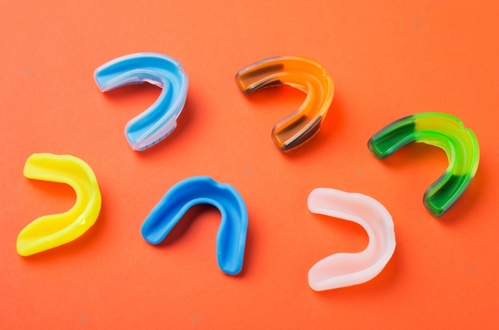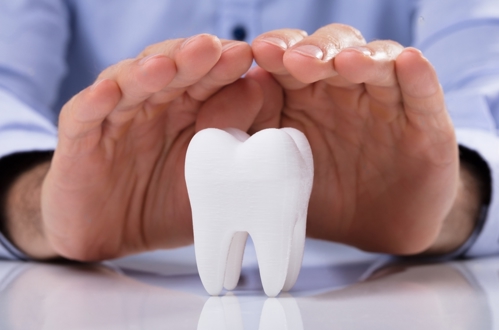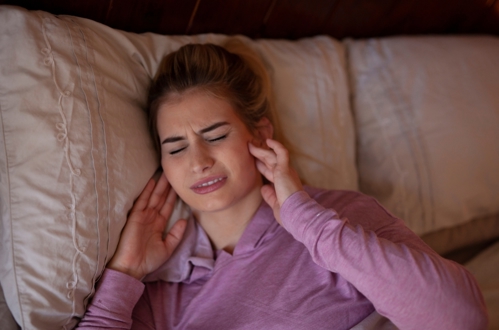
If constant jaw clenching and teeth grinding is getting you down, it could be that you need to read into the various mouthguards pros associated with wearing a mouthguard as a grinding splint.
Grinding your teeth primarily happens at night whilst you sleep, which is why people, especially kids suffering with bruxism (severe teeth grinding) often wake up with a headache, toothache, a sore jaw, and a sore mouth from where their teeth have bitten down so hard.
Bruxism, or even moderate teeth grinding can occur randomly, as a result of medication, or as a result of stress or anxiety. Usually, people that suffer with the condition will be predominantly affected as they sleep, causing them a lot of pain and discomfort when they wake up the following day.
But why wear a mouthguard at night? Well, it turns out that there are plenty of reasons, especially if you suffer from TMJ, bruxism, or teeth grinding of any kind. Here are some of the more prominent advantages of wearing a grinding splint.

If you just had your dental implants, suffer from bruxism or grind your teeth regularly, especially in your sleep and sports, wearing a mouthguard for grinding teeth is ideal and benefits you and your child’s teeth or newly implants dental.
Mouthguards, also known as grinding splints, help to cover the top teeth and dental crowns to prevent them from rubbing and grinding on the lower teeth. Not only do they prevent the teeth and dental implants from grinding, they also help to protect the teeth from any injuries or impact absorbed via teeth clenching, grinding and bruxism.
The pressure that is applied to the teeth when someone grinds them can also cause them to move and shift, which can result in misalignment and alteration of the bite. This may eventually result in the need for orthodontic therapy because of the wear and tear it causes to the tooth over time.
When a mouthguard is used as a grinding splint, pressure is properly distributed over the mouth guards, which helps to stop tooth movement and maintain good tooth alignment.
A lot of bruxism sufferers experience dental issues such as chipped or broken teeth because the grinding while they rest is so severe and so forceful. The mouthguards’ benefit associated with wearing a dental splint is the fact that they prevent the tooth from getting injuries.
For athletic people, wearing custom-fitted mouth guards also benefits them during body contact physical activity and sports, especially contact sports that involve lots of body contact. Sports mouthguards will help them to reduce the risk of dental and oral injuries from the accident contact.

TMJ, is a term used to describe a condition known as temporomandibular joint disorder.
Your temporomandibular joint basically attaches your mandible to your skull and allows your jaw to open and close. TMJ means that the joint becomes damaged, misaligned, or dislodged and it can cause a great deal of pain and discomfort.
TMJ can be caused by the following:
Those affected by TMJ usually experience symptoms such as headaches, a stiff jaw, sensitive teeth, toothache, neck pain, misaligned bite, locked jaw, clicking or popping of the jaw, blurred vision.
TMJ, and indeed, jaw pain in general, can often be caused by bruxism, which is another reason why a mouthguard for sleeping or mouth guard for TMJ is considered to be such a worthy investment. These devices help muscles in the face and jaw to relax, they stop the tooth from clenching and grinding, and they can promote a good night’s rest.
Comparing wearing a mouthguard as a grinding splint to other treatments like dental restorations or orthodontic adjustments, it is a more affordable option. Bruxism can seriously harm the teeth, necessitating pricey dental repairs like fillings, crowns, or even root canals in extreme circumstances.
The need for orthodontic treatment may also arise if the tooth has moved noticeably. These problems can be avoided by using a mouthguard as a grinding splint; this is also a far more cost-effective option over time. A bespoke mouthguard for bruxism is also often covered by dental insurance coverage, which makes it an even more affordable choice.
Also known as night guards or dental splints, if you visit your dentist or cosmetic dentistry and have one custom made, you can guarantee a perfect fit, maximum protection, and maximum comfort as well.
As we touched upon briefly before, if you suffer with teeth grinding or clenching, TMJ, or any similar issues, it is always best to visit your dentist or cosmetic dentistry and request them create a custom dental splint for you.
A custom made mouthguard for TMJ will be made from strong and durable materials, it will be customised for your mouth and 3D-printed for the most comfortable fit possible, and it will offer much more protection than generic stock mouthguards which are mass produced.
If you have bruxism, TMJ, misaligned teeth, or any other dental issues, it is always recommended that you visit your dentist clinic and have them examine your teeth and mouth and create a custom fit mouthguard for you.
Some of the main mouthguards pros associated with a custom-made dental splint are that the splints themselves are so strong and durable, while also fitting over your teeth perfectly and staying perfectly in place.
Dental practices 3D print their mouthguards using the latest technology, in the cleanest and most sterile of conditions, using state of the art lab equipment. This guarantees maximum protection and maximum comfort, without costing patients the Earth.